- Home
- Bella Forrest
The Girl Who Dared to Lead
The Girl Who Dared to Lead Read online
The Girl Who Dared to Think 5: The Girl Who Dared to Lead
Bella Forrest
Copyright © 2018 by Bella Forrest
Nightlight
All rights reserved.
No part of this book may be reproduced in any form or by any electronic or mechanical means, including information storage and retrieval systems, without written permission from the author, except for the use of brief quotations in a book review.
Contents
Problems reading?
Chapter 1
Chapter 2
Chapter 3
Chapter 4
Chapter 5
Chapter 6
Chapter 7
Chapter 8
Chapter 9
Chapter 10
Chapter 11
Chapter 12
Chapter 13
Chapter 14
Chapter 15
Chapter 16
Chapter 17
Chapter 18
Chapter 19
Chapter 20
Chapter 21
Chapter 22
Chapter 23
Chapter 24
Chapter 25
Chapter 26
Chapter 27
Chapter 28
Chapter 29
Chapter 30
Chapter 31
Chapter 32
Chapter 33
Read More by Bella Forrest
Problems reading?
If you experience any problems reading this ebook—such as pages skipping, etc.—it’s a Kindle glitch. Just delete the ebook from your device and re-download it, and the problem should solve itself. If not, contact Amazon’s customer support; they’re usually very helpful and efficient.
1
Before the Tower, humanity was free in the only way that truly mattered—humans had an implicit understanding that they could express their emotions however they pleased. Some people were quiet and even stoic, yet shared their love through patience and action. Others were scared, terrorized by past horrors over which they couldn’t quite seem to gain control. Even more were driven by greed, lust, jealousy, hope, pride, pleasure, love, compassion, justice… The list was endless, yet filled with a myriad of emotional states that could twist a person’s heart and affect their life. But all of these feelings were understood, and could be met with compassion.
Now, however, humanity couldn’t be bothered to waste time dealing with such trifles. Things like happiness were a luxury, and grief an anathema. Dwelling on any emotions only distracted from the mission of keeping us all alive. It served no purpose other than to satisfy a selfish and petty urge to feel connected. Want to feel connected? Work harder and dedicate yourself to the Tower and to Scipio, our benevolent—and broken—AI overlord. Want to feel emotions? Don’t. The Medica will make sure that you don’t have to anymore.
Before the Tower, humanity was free to laugh, sing, play, and cry. Now, we weren’t expected to do any of that anymore. Instead, we were expected to bury our emotions like we buried our dead, and forget everything.
Except I couldn’t seem to stop feeling. I felt everything like it was a raw, festering wound buried deep inside, right next to the names of those I had lost: Cali Kerrin, former Lieutenant to Devon Alexander, both of whom I had killed in one way or another. Roark, the man who had saved me from a fate worse than death, and Ambrose Klein, a man whom I’d failed to protect.
And now my mother. My mother. Holly Castell. Gone.
I was pretty sure no one had been as surprised as I was at the depth of my grief. It didn’t make sense—we hadn’t been close for the past twenty years of my life—but I couldn’t seem to control the aching pain in my chest that only got worse as time dragged on.
My eyelids slid open, and for a moment I just stared, waiting to see if the tears would come or not. They hadn’t during the last two nights, but I couldn’t always predict when they would. Nor could I predict what sort of tears they would be. Would it be the kind of crying where I curled up into a ball and wheezed out my tears in the grip of panic, or would it be the one where tears slid down my face in silence?
Yet another thing I couldn’t control. Sometimes I hated the tears when they came, but they often came nonetheless when my thoughts drifted toward her.
No tears. None ever seemed to come in the cover of darkness. Maybe it was because there was no one awake to witness them, or maybe it was because on this night, just like the past two, I had a sort of grim purpose that seemed to supersede everything else, including my own grief. Either way, I found myself only with dry eyes that ached in the minimal lighting of the room.
For several long seconds I lay there, listening to the sounds of soft breathing filling the small compartment that was my room. I didn’t remember going to bed—when I hadn’t been a crying mess, I’d been left with a strangely disconnected sensation that made it difficult to remember parts of the day—but I was unsurprised by the company. My friends had been holding a weird sort of vigil by my side. And that included slumber parties, apparently.
I was grateful to them. I knew they were doing everything in their power to be here for me. I just wished I could give them what they wanted: for me to talk.
But how could I talk when I couldn’t make sense of the feelings inside of me? Why was I so torn up about a woman who had treated me like crap? Yes, we had been on a path to working out our problems. My mother had begun to look past the veil the Tower had placed over her eyes. She’d chosen to believe me.
She’d told me she’d loved me.
Then she was gone.
And I couldn’t seem to stop hurting.
And I couldn’t understand why.
It was why I kept getting up when I should be sleeping and slipping past my friends like some sort of thief in the night. But it was the only way I could be alone, and I desperately needed it.
I’d made the journey twice before, on the two previous nights, but my thoughts were still jumbled and chaotic. And I had to clear them. Today was too important for me to be anything but clearheaded.
As rational as that reason was, there was another, darker purpose behind my midnight escapades, which was currently in the living area of my apartment.
Getting to it, however, was slightly tricky.
I stared at the back of my best friend Zoe’s head, studying her body. Her shoulder and side moved up and down with slow, even breaths, telling me she was asleep. And why wouldn’t she be, at three in the morning? She wasn’t plagued by the memories of falling, or the nightmares peopled with what-ifs. She wasn’t dreaming of getting my mother to the Medics in time and saving her… only to wake up and find that she was still gone and nothing had changed.
Scipio help me, I hated how much that realization hurt, almost as much as I hated my mind for playing tricks on me in the first place.
I sat up slowly, careful not to make any noise or pull too much on the blanket Zoe and I were sharing, for fear it would wake her. At the foot of the bed, I heard a soft snort and froze, lifting my head slightly to peer along the edge of the blanket to where a small girl was sleeping, her legs propped up against the wall. Her eyes remained closed, her breathing soft and even, and I quickly seized the opportunity to wriggle my feet out from under her and carefully ease my way out of bed. Tian, the youngest member of our group, didn’t move as I did so, and I felt confident I hadn’t woken her.
My feet hit the cold floor, and I curled my toes in tight as I stared at my final obstacle: the tall, muscular girl spread out like a starfish on the floor. Maddox. Her blanket was twisted up around her, and her pillow was being used to cushion her knee, creating an obstacle course that I would have to navigate quickly and carefully, lest I wake her up.
I reached out, grabbed my robe from where I had hung it next to the bed last night, and slipped it on, sliding my hair out from under the edge of it. I held my breath for a second, and then stood up, crossing the floor with a light step. I didn’t stop until I hit the button next to the door, causing it to slide open with a pneumonic hiss that seemed unnaturally loud in my mind. I stepped through quickly, and then took a look back over my shoulder.
Nobody had moved. Three sets of lungs inhaled and exhaled softly, Maddox’s breath ending in a slight snore. They were still asleep.
I pressed the button on the outside and closed the door, feeling a hollow pang of regret as I did so. I knew what I was doing wasn’t what they wanted. They were all waiting for me to speak to them, to let them in. And I desperately wanted to, but how could I even begin to describe it, when I didn’t understand it? It was frustrating because I just wanted this to stop, to go away, but I couldn’t seem to make it. It was like there were two Lianas inside me, fighting for control. Or maybe not control, but just the right to… feel… something?
I didn’t know. Nothing made any sense.
I supposed I could just try to talk to my friends again. I knew exactly where I’d start. My mother died three days ago. She was murdered three days ago. I feel…
There were so many words to choose from. So many different flavors of grief. Too many, if you really thought about it. Regret, shame, rage, loss, absence, melancholy, depression… And not a single one quite nuanced enough to encapsulate the myriad of emotions that I couldn’t seem to control. They made me afraid of what I would say and to whom I would say it if I opened my mouth. Afraid of what would happen when I did speak. Afraid to even admit she was gone, for fear that I would start crying again. So I stayed quiet instead. It was better that way, anyway; the last three days had passed in a haze of grief, and it had helped me cope when all the questions and investigations started.
Not that those resulted in much, either. Nothing had changed since the end of the Tourney. I had been named Champion—the leader of the Department of Knights, meant to protect the Citadel—but it was being held up, pending the investigation by the council and Scipio into what had caused the situation with the sentinel that had killed my mother and her friend, Min-Ha Kim, during the final challenge. Oh, and a further investigation into why I had just happened to have a sentinel-defeating (and completely illegal) weapon on me during an official challenge.
The official story was that the sentinel had been authorized as an additional obstacle for the last challenge, but that something had, of course, gone terribly wrong. The designers had no clue what; hence the three-day-long investigation that had stalled everything.
But it was just that—a story—whereas the truth was a touch darker: someone had put a rogue AI fragment named Jang-Mi into that sentinel and ordered her to kill off the competition so that one specific candidate would win.
Speaking of which…
I padded down the hall, cinching my robe tighter around myself as I entered the shared living area. The three males in our group were sharing Maddox’s room across the hall from my own, but made sure someone was always in the front room in case our enemies tried to attack us. They’d broken the night into shifts and hadn’t bothered to change the order since.
What they hadn’t thought about was that Eric, Zoe’s boyfriend and one of my oldest friends, couldn’t stay awake past midnight—a byproduct of being raised as a Hand in the farming department. His internal clock was set to rise early, hours before the rest of the Tower, and fall asleep not too long after sundown. The others hadn’t caught on yet because he woke up an hour before everyone else did. I wasn’t sure why he hadn’t mentioned it to the others. Maybe he thought he’d only dozed off for a few minutes or something. Either way, it was a flaw, and a big one that needed to be addressed—but it didn’t stop me from taking advantage of it now.
Sure enough, it was Eric’s turn in the front room, and there he was, splayed out on the couch, using the arm as a pillow. His own arm was resting across his head, keeping the light from reaching his closed eyelids, and he had thrown one leg over the back of the couch. His breathing was deep and even, the large expanse of his chest rising and falling rhythmically.
I stood in the center of the room watching him for a second, and then lowered my gaze to the table in front of the couch, where a clear plastic box with glowing purple and green lights sat, the lights pulsating with life. An intense stab of hatred hit me as I gazed at it, but I stoically pushed it away and scooped the box up, carrying it over to the entryway.
I pulled out the spare set of clothes I had stashed in the closet next to the front door—black, and with no insignia to show what department I was from—and quickly got dressed, not bothering to mask my sounds. Doing so would only create irregular noises, something we were trained to identify when we were sleeping, as a matter of survival and self-preservation. Trying to hide what I was doing would only give Eric’s sleeping mind a greater chance of noticing and waking up to investigate, and I didn’t want that. It would defeat the purpose.
Once dressed, I slid the box of light into a bag that I had also stored in the closet and draped the bag over my shoulder, resting it against my hip. One last thing—a hat—completed the ensemble, and I quickly hit the button for the door and stepped out into the wide hall. I waited for the door to close, and then left, not even bothering to make sure my escape was clean.
My walk was robotic, my eyes fixed on the ground. It was stupid to be out alone, but I didn’t care; I had been taking this walk for the last three nights, and no one had tried anything. In truth, I kind of hoped that they would—it would give me an outlet for some of the deep-seated rage that boiled just under my skin. If they would just strike, I could finally have a target, something I could wrap my hands around and punish for everything they’d done to me, to my mother, to Ambrose, to the Tower. Maybe I’d even keep one of them alive, and make him talk, tell me who my enemy was. A name was all I wanted. The name of who was in charge.
But no one bothered me. The hat did its job in disguising my most noticeable attribute—my amber eyes—and it was early, which meant that only the grave shift was on duty. But the hat was only to prevent me from being recognized in the halls, keeping me hidden from people who might try to make me do the one thing I didn’t want to do: talk. It would do nothing to stop my enemies from tracking me. All they needed to do was have access to the sensors and the Citadel, and they could find me easily enough.
But I wasn’t exactly trying to hide from them. Just everyone else.
And though the halls were more heavily patrolled, if you knew the way around the patrols, you could find clear paths easily enough. Plus the stairs were always free. As they had been for the past three nights.
I made my way down them until I reached the floor I was looking for, and slipped back into the halls. I was stopped only once—at the exit leading to the bridge that connected to the outer shell of the Tower.
“Down here again, girl?” Lewis asked gruffly, sliding into place next to me as I walked toward the dark archway that served as the exit. “Why aren’t you asleep?”
I gave him a look from the corner of my eye, noting the dark bags under his own blue eyes, and the white scruff that was now forming on his cheeks and chin. Only his mustache seemed in order, if heavily tugged upon. I arched an eyebrow and tilted my chin up enough to meet his gaze for a second.
“You’re one to talk,” I said softly.
Talking was hard—my vocal cords seemed resistant to use—but I forced the words out anyway, barely managing a volume above a throaty rasp. Still, Lewis heard me, which wasn’t particularly hard in the relative emptiness of the reception area, and sighed heavily.
“Scipio help you, Liana, where are you going each night? Why are you even going out? You know Astrid wouldn’t like the idea of you leaving the safety of the Citadel and exposing yourself like this! You can’t keep doing this. You need to talk to someone.”
Even
though his observation was perfectly reasonable, and a part of me wanted to do just that, I got frustrated instead, my mouth drawing into a thin, flat line. Frustrated and downright angry. I was still in the process of trying to figure it out, and everyone just wanted me to be able to explain every little thing. I wasn’t ready—if I were, then I could figure out why the heck this kept eating at me as intensely as it did, deal with it, and move on.
But no, I had to be ready to go on their timetable, to just open my mouth and talk about her, about the complicated mess of our relationship, and about how I felt now that she was gone.
Tears bit into my eyes as the hollow ache of simply missing her hit me like a sledgehammer, coupled with the knowledge that I would never see her again. Wetness spread to my lashes, and I could tell that if I left it, it would turn into tears that would slowly roll down my cheeks. It was so strange to have cried so much for a person I had spent most of my life resenting, but I couldn’t seem to gain any control over it.
And that only made me feel even worse.
My vision grew blurred, signaling that my tears were about to spill over, and I dragged my thoughts back from the edge. I didn’t want Lewis to see me cry—didn’t want to be vulnerable like that in front of him—and quickly lowered my head and wiped my eyes, doing my best to disguise my actions while pushing the pain back.
I managed to keep my breathing even, trying for some semblance of calm (although who knew what that felt like anymore), and repeated the argument that had gotten him to leave me alone for the past three nights. “Lewis, you and I both know that you voted for me to be the Champion. And you yourself told me that in your mind, that made me the Champion. So as your Champion, I’m asking you to get out of my way.”

 The Gender Game
The Gender Game A Shade of Kiev 3
A Shade of Kiev 3 A Sword of Chance
A Sword of Chance Beautiful Monster 2
Beautiful Monster 2 A Castle of Sand
A Castle of Sand A Tangle of Hearts
A Tangle of Hearts A Shadow of Light
A Shadow of Light A Shield of Glass
A Shield of Glass A Dawn of Strength
A Dawn of Strength A Blaze of Sun
A Blaze of Sun A City of Lies
A City of Lies Fall With Me
Fall With Me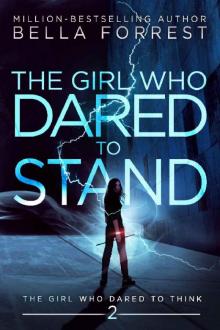 The Girl Who Dared to Stand
The Girl Who Dared to Stand A Gate of Night
A Gate of Night A Snare of Vengeance
A Snare of Vengeance A Twist of Fates
A Twist of Fates A Race of Trials
A Race of Trials A House of Mysteries
A House of Mysteries A Tide of War
A Tide of War Invaders
Invaders A Flight of Souls
A Flight of Souls Allies
Allies Renegades
Renegades A Clan of Novaks
A Clan of Novaks A Gift of Three
A Gift of Three A Ride of Peril
A Ride of Peril A Break of Day
A Break of Day Beautiful Monster
Beautiful Monster The Breaker
The Breaker A King of Shadow
A King of Shadow A Web of Lies
A Web of Lies The Gender Secret
The Gender Secret Stargazers
Stargazers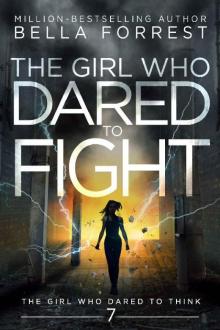 The Girl Who Dared to Fight
The Girl Who Dared to Fight A Throne of Fire
A Throne of Fire A Shade of Novak
A Shade of Novak A Voyage of Founders
A Voyage of Founders A Clash of Storms
A Clash of Storms A Charge of Allies
A Charge of Allies A Shade of Dragon 2
A Shade of Dragon 2 The Girl Who Dared to Descend
The Girl Who Dared to Descend A Call of Vampires
A Call of Vampires The Spell
The Spell A Wind of Change
A Wind of Change Natural Law
Natural Law A Hero of Realms
A Hero of Realms Venturers
Venturers A Citadel of Captives
A Citadel of Captives A League of Exiles
A League of Exiles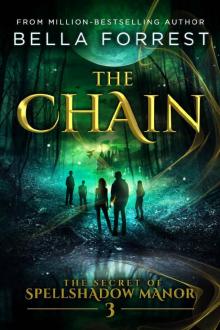 The Chain
The Chain A Game of Risk
A Game of Risk Deep Shadows
Deep Shadows A Land of Perfects
A Land of Perfects A Soldier of Shadows
A Soldier of Shadows A Shade of Vampire
A Shade of Vampire A Shade of Blood
A Shade of Blood A Dawn of Guardians
A Dawn of Guardians The Gender Lie
The Gender Lie A Fork of Paths
A Fork of Paths The Girl Who Dared to Rise
The Girl Who Dared to Rise Hotbloods
Hotbloods A Turn of Tides
A Turn of Tides The Gender End
The Gender End The Child Thief
The Child Thief A Shade of Kiev
A Shade of Kiev An End of Night
An End of Night A Shade of Doubt
A Shade of Doubt The Girl Who Dared to Think
The Girl Who Dared to Think A Rip of Realms
A Rip of Realms The Gender Fall
The Gender Fall A Bond of Blood
A Bond of Blood Traitors
Traitors The Gender War
The Gender War A Tip of Balance
A Tip of Balance An Empire of Stones
An Empire of Stones A Shade of Dragon 3
A Shade of Dragon 3 Coldbloods
Coldbloods A Valley of Darkness
A Valley of Darkness A Passage of Threats
A Passage of Threats Harley Merlin 19: Persie Merlin and the Door to Nowhere
Harley Merlin 19: Persie Merlin and the Door to Nowhere The Girl Who Dared to Lead
The Girl Who Dared to Lead A Meet of Tribes
A Meet of Tribes A Power of Old
A Power of Old A Vial of Life
A Vial of Life A Hunt of Fiends
A Hunt of Fiends A World of New
A World of New A Shade of Vampire 89: A Sanctuary of Foes
A Shade of Vampire 89: A Sanctuary of Foes A Den of Tricks
A Den of Tricks Harley Merlin 12
Harley Merlin 12 The Gender Plan
The Gender Plan A Shade of Vampire 85: A Shard of Soul
A Shade of Vampire 85: A Shard of Soul The Gender Game 2
The Gender Game 2 A Trail of Echoes
A Trail of Echoes A Dome of Blood
A Dome of Blood The Secret of Spellshadow Manor 2
The Secret of Spellshadow Manor 2 The Secret of Spellshadow Manor 6
The Secret of Spellshadow Manor 6 The Secret of Spellshadow Manor
The Secret of Spellshadow Manor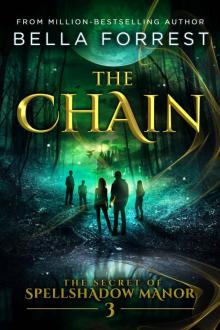 The Secret of Spellshadow Manor 3
The Secret of Spellshadow Manor 3 The Girl Who Dared to Endure
The Girl Who Dared to Endure A Bridge of Stars
A Bridge of Stars A Shade of Kiev 2
A Shade of Kiev 2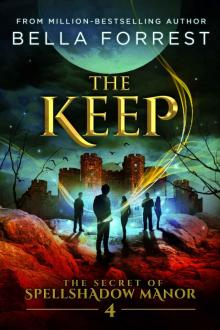 The Keep
The Keep A Touch of Truth
A Touch of Truth An Hour of Need
An Hour of Need A Spell of Time
A Spell of Time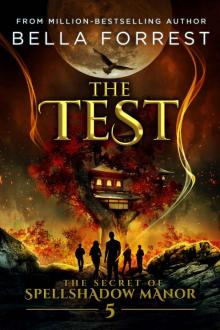 The Secret of Spellshadow Manor 5
The Secret of Spellshadow Manor 5 A Shade of Dragon
A Shade of Dragon A Battle of Souls
A Battle of Souls Bare Girl
Bare Girl A Day of Glory
A Day of Glory A Chase of Prey
A Chase of Prey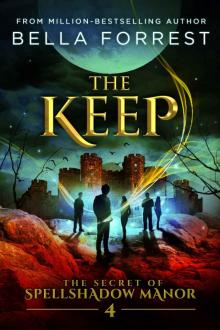 The Secret of Spellshadow Manor 4
The Secret of Spellshadow Manor 4 The Test
The Test A Shade of Vampire 32: A Day of Glory
A Shade of Vampire 32: A Day of Glory A Shade of Vampire 20: A Hero of Realms
A Shade of Vampire 20: A Hero of Realms A Shade of Vampire 54_A Den of Tricks
A Shade of Vampire 54_A Den of Tricks The Girl Who Dared to Think 6: The Girl Who Dared to Endure
The Girl Who Dared to Think 6: The Girl Who Dared to Endure A Shade of Vampire 23: A Flight of Souls
A Shade of Vampire 23: A Flight of Souls A Shade of Vampire 8: A Shade of Novak
A Shade of Vampire 8: A Shade of Novak The Gender War (The Gender Game #4)
The Gender War (The Gender Game #4)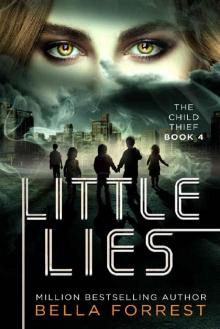 The Child Thief 4: Little Lies
The Child Thief 4: Little Lies A Shade of Vampire 9
A Shade of Vampire 9 A Shade of Vampire 46: A Ride of Peril
A Shade of Vampire 46: A Ride of Peril A Shade of Vampire 27: A Web of Lies
A Shade of Vampire 27: A Web of Lies Hotbloods 6: Allies
Hotbloods 6: Allies A Shade of Vampire 31: A Twist of Fates
A Shade of Vampire 31: A Twist of Fates A Shade of Vampire 43: A House of Mysteries
A Shade of Vampire 43: A House of Mysteries A Shade of Vampire 52
A Shade of Vampire 52 A Shade of Vampire 28: A Touch of Truth
A Shade of Vampire 28: A Touch of Truth A Shade of Vampire 44
A Shade of Vampire 44 A Shade of Vampire 14: A Dawn of Strength
A Shade of Vampire 14: A Dawn of Strength A Shade Of Vampire 5: A Blaze Of Sun
A Shade Of Vampire 5: A Blaze Of Sun A Shade Of Vampire 2: A Shade Of Blood
A Shade Of Vampire 2: A Shade Of Blood A Shade of Vampire 51
A Shade of Vampire 51 A Shade of Vampire 56_A League of Exiles
A Shade of Vampire 56_A League of Exiles The Gender Lie (The Gender Game #3)
The Gender Lie (The Gender Game #3) A Shade of Vampire 29
A Shade of Vampire 29 A Shade of Vampire 21: A Vial of Life
A Shade of Vampire 21: A Vial of Life A Shade of Vampire 27
A Shade of Vampire 27 A Shade of Vampire 33: A Dawn of Guardians
A Shade of Vampire 33: A Dawn of Guardians The Gender Game 5: The Gender Fall
The Gender Game 5: The Gender Fall A Shade Of Vampire 6: A Gate Of Night
A Shade Of Vampire 6: A Gate Of Night A Shade of Vampire 57: A Charge of Allies
A Shade of Vampire 57: A Charge of Allies A Shade of Vampire 48
A Shade of Vampire 48 A Shade of Vampire 8
A Shade of Vampire 8 A Shade of Vampire 35: A Race of Trials
A Shade of Vampire 35: A Race of Trials A Shade of Vampire 65: A Plague of Deceit
A Shade of Vampire 65: A Plague of Deceit A Shade of Vampire 64: A Camp of Savages
A Shade of Vampire 64: A Camp of Savages A Shade of Vampire 53_A Hunt of Fiends
A Shade of Vampire 53_A Hunt of Fiends A Shade of Vampire 22
A Shade of Vampire 22 A Shade of Vampire 63: A Jungle of Rogues
A Shade of Vampire 63: A Jungle of Rogues The Gender Game 2: The Gender Secret
The Gender Game 2: The Gender Secret A Shade of Vampire 47: A Passage of Threats
A Shade of Vampire 47: A Passage of Threats A Shade of Vampire 37: An Empire of Stones
A Shade of Vampire 37: An Empire of Stones A Shade of Vampire 57
A Shade of Vampire 57 A Shade of Vampire 30
A Shade of Vampire 30 A Shade of Vampire 39: A Rip of Realms
A Shade of Vampire 39: A Rip of Realms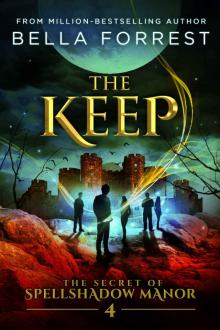 The Secret of Spellshadow Manor 4: The Keep
The Secret of Spellshadow Manor 4: The Keep A Shade of Vampire 50
A Shade of Vampire 50 Hotbloods Book 3_Renegades
Hotbloods Book 3_Renegades Hotbloods 8: Stargazers
Hotbloods 8: Stargazers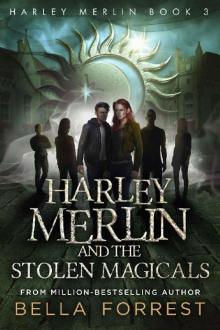 Harley Merlin 3: Harley Merlin and the Stolen Magicals
Harley Merlin 3: Harley Merlin and the Stolen Magicals A Shade of Vampire 10
A Shade of Vampire 10 A Shade of Vampire 51_A Call of Vampires
A Shade of Vampire 51_A Call of Vampires A Shade of Vampire 32
A Shade of Vampire 32 A Shade Of Vampire 2
A Shade Of Vampire 2 A Shade of Vampire 55
A Shade of Vampire 55 A Shade Of Vampire 6
A Shade Of Vampire 6 The Girl Who Dared to Think 3: The Girl Who Dared to Descend
The Girl Who Dared to Think 3: The Girl Who Dared to Descend A Shade of Vampire 23
A Shade of Vampire 23 A Shade of Vampire 37
A Shade of Vampire 37 A Shade of Vampire 43
A Shade of Vampire 43 A Shade of Vampire 61_A Land of Perfects
A Shade of Vampire 61_A Land of Perfects A Shade of Vampire 47
A Shade of Vampire 47 A Fall of Secrets
A Fall of Secrets The Secret of Spellshadow Manor 6: The Spell
The Secret of Spellshadow Manor 6: The Spell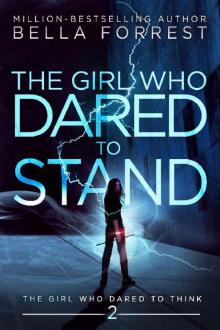 The Girl Who Dared to Think 2: The Girl Who Dared to Stand
The Girl Who Dared to Think 2: The Girl Who Dared to Stand A Shade of Vampire 46
A Shade of Vampire 46 A Shade of Vampire 66: An Edge of Malice
A Shade of Vampire 66: An Edge of Malice The Secret of Spellshadow Manor 2: The Breaker
The Secret of Spellshadow Manor 2: The Breaker The Child Thief 2: Deep Shadows
The Child Thief 2: Deep Shadows The Girl Who Dared to Think 4: The Girl Who Dared to Rise
The Girl Who Dared to Think 4: The Girl Who Dared to Rise Hotbloods 5_Traitors
Hotbloods 5_Traitors A Shade of Vampire 25
A Shade of Vampire 25 A Shade of Vampire 54
A Shade of Vampire 54 The Gender Game 4: The Gender War
The Gender Game 4: The Gender War A Shade of Vampire 19: A Soldier of Shadows
A Shade of Vampire 19: A Soldier of Shadows A Shade of Vampire 34
A Shade of Vampire 34 A Shade of Vampire 31
A Shade of Vampire 31 A Shade Of Vampire 5
A Shade Of Vampire 5 A Shade of Vampire 49
A Shade of Vampire 49 A Shade Of Vampire (The Mate)
A Shade Of Vampire (The Mate) Invaders_Hotbloods 7
Invaders_Hotbloods 7 A Shade of Vampire 36: A King of Shadow
A Shade of Vampire 36: A King of Shadow A Shade of Vampire 50: A Clash of Storms
A Shade of Vampire 50: A Clash of Storms A Shade of Vampire 35
A Shade of Vampire 35 A Shade of Vampire 21
A Shade of Vampire 21 A Shade of Vampire 25: A Clan of Novaks
A Shade of Vampire 25: A Clan of Novaks A Shade of Vampire 36
A Shade of Vampire 36 A Shade of Vampire 52_A Valley of Darkness
A Shade of Vampire 52_A Valley of Darkness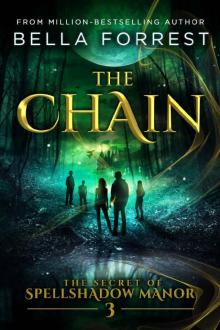 The Secret of Spellshadow Manor 3: The Chain
The Secret of Spellshadow Manor 3: The Chain A Shade of Vampire 42
A Shade of Vampire 42 A Shade of Vampire 58_A Snare of Vengeance
A Shade of Vampire 58_A Snare of Vengeance A Shade of Vampire 60_A Voyage of Founders
A Shade of Vampire 60_A Voyage of Founders A Shade of Vampire 39
A Shade of Vampire 39 A Shade of Vampire 29: An Hour of Need
A Shade of Vampire 29: An Hour of Need A Shade of Vampire 62_A Citadel of Captives
A Shade of Vampire 62_A Citadel of Captives A Shade of Vampire 33
A Shade of Vampire 33 A Shade of Vampire 16
A Shade of Vampire 16 A Shade of Vampire 41
A Shade of Vampire 41 A Shade of Vampire 13
A Shade of Vampire 13 A Shade of Vampire 20
A Shade of Vampire 20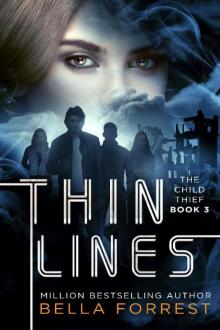 The Child Thief 3: Thin Lines
The Child Thief 3: Thin Lines A Shade of Vampire 45: A Meet of Tribes
A Shade of Vampire 45: A Meet of Tribes A Shade of Vampire 14
A Shade of Vampire 14 A Shade of Vampire 7
A Shade of Vampire 7 A Shade of Vampire 28
A Shade of Vampire 28 Bare Girl: A page-turning serial killer thriller (Detective Erin Bond Book 1)
Bare Girl: A page-turning serial killer thriller (Detective Erin Bond Book 1) A Shade of Vampire 44: A Tangle of Hearts
A Shade of Vampire 44: A Tangle of Hearts A Shade of Vampire 53
A Shade of Vampire 53 A Shade of Vampire 8: A Shade of Kiev
A Shade of Vampire 8: A Shade of Kiev A Shade of Vampire 49: A Shield of Glass
A Shade of Vampire 49: A Shield of Glass A Shade of Vampire 30: A Game of Risk
A Shade of Vampire 30: A Game of Risk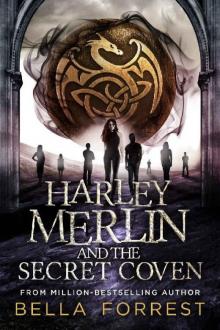 Harley Merlin and the Secret Coven
Harley Merlin and the Secret Coven A Shade of Vampire 24: A Bridge of Stars
A Shade of Vampire 24: A Bridge of Stars A Shade Of Vampire 4
A Shade Of Vampire 4 A Shade of Vampire 59_A Battle of Souls
A Shade of Vampire 59_A Battle of Souls Hotbloods 4: Venturers
Hotbloods 4: Venturers A Shade of Vampire 11
A Shade of Vampire 11 A Shade of Vampire 40: A Throne of Fire
A Shade of Vampire 40: A Throne of Fire A Shade of Vampire 15
A Shade of Vampire 15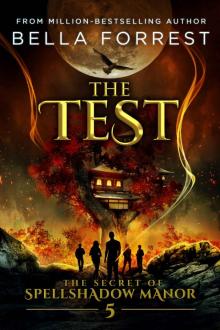 The Secret of Spellshadow Manor 5: The Test
The Secret of Spellshadow Manor 5: The Test A Shade of Vampire 56
A Shade of Vampire 56 A Shade of Vampire 41: A Tide of War
A Shade of Vampire 41: A Tide of War A Shade of Vampire 45
A Shade of Vampire 45 A World of New (A Shade of Vampire #26)
A World of New (A Shade of Vampire #26)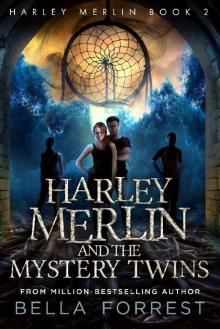 Harley Merlin 2: Harley Merlin and the Mystery Twins
Harley Merlin 2: Harley Merlin and the Mystery Twins A Shade of Vampire 19
A Shade of Vampire 19 A Shade of Vampire 48: A Tip of Balance
A Shade of Vampire 48: A Tip of Balance